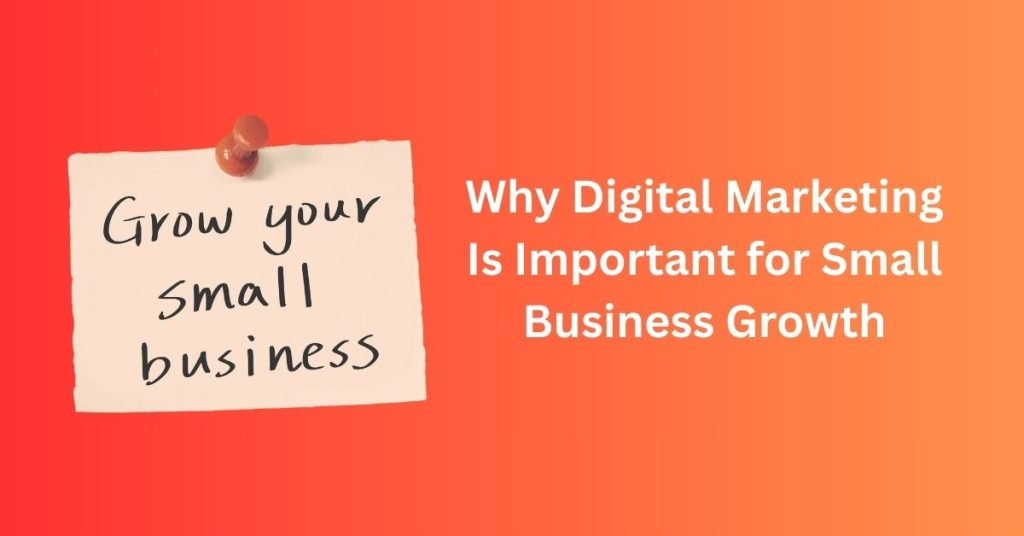
Running a small business today isn’t just about having a great product or service. It’s about being visible where your customers are online. That’s where digital marketing steps in. If you’ve ever wondered why digital marketing is important for small business growth, the answer lies in how it levels the playing field. It helps smaller companies compete with larger brands, connect with the right audience, and grow faster without burning through massive budgets.
Understanding Digital Marketing in a Business Context
Digital marketing is any form of promotion that uses online platforms, search engines, social media, email, websites, and mobile apps to reach potential customers. Unlike traditional marketing, which relies heavily on print, TV, or billboards, digital marketing allows small businesses to measure results, track performance, and adjust campaigns in real time.
Why Is Digital Marketing Important for Small Businesses?
For small businesses, digital marketing is not optional; it’s essential. Customers today search online before buying almost anything, from a cup of coffee to a new house. If your business isn’t visible, your competitors will take the lead. That’s why digital marketing is important for small businesses; it ensures that your product or service is discoverable when your target audience is actively looking for it.
What Are the Benefits of Digital Marketing for Small Businesses?
When you look at small businesses, every marketing effort has to count. That’s where digital marketing shines: it delivers measurable impact without draining your budget. Let’s break down the key benefits it brings to small businesses.
Cost-effective marketing channel
One of the most significant advantages of digital marketing is cost-effectiveness. Unlike print ads or TV commercials, you can start small, run budget-friendly campaigns, and still reach thousands of potential customers. This makes the importance of digital marketing in business undeniable.
Targeted audience reach
Instead of broadcasting to everyone, digital platforms let you target based on age, gender, interests, or location. Imagine a bakery promoting new cakes only to people within 5 km, that’s the power of local targeting.
Real-time analytics and data-driven decisions
With tools like Google Analytics or Facebook Insights, you don’t have to guess what’s working. You can see which ads bring clicks, which posts drive sales, and make quick changes. That’s the benefit of digital marketing, data takes the guesswork out.
Increased customer engagement and retention
Digital marketing allows two-way conversations. Customers can comment, share, or ask questions instantly. This engagement builds trust, making them more likely to come back and recommend your business.
Flexibility and scalability
Whether you’re running a seasonal sale or launching a new product, digital campaigns can be scaled up or down instantly. That flexibility helps small businesses adapt quickly without incurring significant costs.
How Digital Marketing Helps Small Businesses Grow
Creating a Strong Online Brand Identity
Having a strong online presence is like having a 24/7 shop window. A consistent brand voice across social media, your website, and ads makes you memorable and trustworthy.
Lead Generation Through Multiple Channels
From SEO to social media ads, email campaigns to WhatsApp messages, digital marketing provides endless opportunities to generate quality leads beyond just walk-in customers.
Building Customer Loyalty and Repeat Business
Retaining customers is cheaper than finding new ones. Digital marketing tools like email newsletters and loyalty programs keep customers engaged and encourage repeat purchases.
Outperforming Local Competitors With Better Visibility
Many small businesses don’t invest in digital marketing. By simply optimizing your website or running targeted local ads, you can appear before competitors in search results and attract local customers.
Key Digital Marketing Strategies for Small Businesses
1. Search Engine Optimization (SEO)
SEO ensures your business shows up when people search online. The importance of SEO in digital marketing is huge, it drives organic traffic, builds credibility, and delivers long-term results.
- How small businesses can use SEO to drive visibility: Optimize your website with relevant keywords, write helpful content, and focus on fast loading speed.
- Local SEO for local reach: Add your business to Google My Business, collect reviews, and use location-based keywords.
2. Social Media Marketing
Every business doesn’t need to be on every platform. A café may thrive on Instagram, while a consultancy works better on LinkedIn. Choose platforms where your audience spends the most time and create engaging, shareable content.
3. Pay-Per-Click Advertising (PPC)
PPC allows you to advertise directly on Google or social media platforms. The best part? You only pay when someone clicks your ad. Even a small daily budget can generate quality leads.
4. Email Marketing
Email remains one of the most reliable tools. Personalized newsletters, product updates, and offers nurture leads and push them toward conversions.
5. Content Marketing
Content isn’t just blogs; it’s videos, guides, FAQs, and infographics. By answering customer questions and sharing insights, you build trust and position yourself as an expert. This proves the importance of online marketing for small businesses.
6. WhatsApp & SMS Marketing
High open rates make WhatsApp and SMS ideal for instant engagement. From flash sales to appointment reminders, these platforms keep your brand at the top of your customers’ minds.
Does Digital Marketing Replace Traditional Marketing?
Not entirely. Traditional marketing like flyers, posters, and radio ads still have their place, especially for hyperlocal businesses. But when combined with digital marketing, the impact multiplies. That’s why the importance of a digital marketing strategy to small businesses lies in blending both worlds smartly.
How to Get Started in Digital Marketing for Your Business
- Set Clear Goals and Audience Personas – Know who you’re targeting and what you want to achieve.
- Build a Basic Website or Landing Page – Even a one-page site builds credibility.
- Choose the Right Digital Channels for Your Business Type – Select platforms that align with your audience.
- Set a Realistic Budget and Start Small – You don’t need to spend big to see results.
- Use Tools for Measurement (Google Analytics, GSC, etc.) – Track your performance and improve continuously.
Practical Tips for Small Businesses to Succeed in Digital Marketing
- Budget constraints: Start with free tools like Canva, Mailchimp, or Google My Business.
- Lack of digital knowledge: Learn the basics through free courses (Google Digital Garage, HubSpot Academy).
- Finding the right team/agency: Partner with agencies that specialize in small business marketing.
- Time management: Automate tasks like social posting and email campaigns to save time.
Common Challenges and How to Overcome Them
Running digital marketing for a small business isn’t always smooth sailing. Most owners face similar roadblocks; however, these can be solved with the right approach. Here are the common challenges and how to tackle them:
1. Budget constraints
Small businesses often hesitate because of tight budgets. The solution is to start small with free or low-cost channels like social media and email marketing. Scale only when you see results.
2. Lack of digital knowledge
Not every business owner is tech-savvy. This can be overcome through free online courses, tutorials, or by outsourcing specific tasks to experts while learning the basics yourself.
3. Finding the right team/agency
Choosing an agency or freelancer can feel overwhelming. Look for partners who understand your industry, show transparency in reporting, and can adapt strategies as your business grows.
4. Time management
Juggling marketing with daily operations is tough. Automating repetitive tasks, like social media scheduling, email campaigns, and analytics reports, can save time without compromising results.
Final Thoughts: Scaling Growth with Digital Marketing
Small businesses don’t need massive budgets to succeed; they need smart strategies. At Trigital, we’ve helped countless businesses grow by combining creativity with data-driven digital campaigns. If you’re ready to take your business online, we can guide you through every step.
Conclusion
For small businesses, digital marketing is no longer a support function; it is a core driver of visibility, customer acquisition, and sustainable growth. From building a strong online presence through SEO and content marketing to leveraging cost-efficient channels like email, social, and WhatsApp, digital marketing provides a measurable impact at every stage of the customer journey.
While challenges such as limited budgets or lack of expertise exist, the adaptability and scalability of digital marketing make it one of the most effective growth levers for small enterprises. With a structured strategy, clear goals, and consistent execution, small businesses can not only compete with larger players but also outperform them in targeted markets.
Ultimately, the importance of digital marketing in business lies in its ability to connect the right audience with the right message at the right time, an advantage no small business can afford to overlook.
Frequently Asked Questions (FAQs)
1. What are the benefits of digital marketing for small businesses?
Digital marketing helps small businesses reach wider audiences, generate qualified leads, and build brand visibility at lower costs. It offers measurable results, improves customer engagement, and provides scalable strategies to grow consistently in both local and global markets.
2. Is digital marketing more effective than traditional methods?
Yes. Digital marketing is often more cost-efficient and measurable than traditional advertising. It allows businesses to target specific audiences, track performance in real time, and adjust strategies instantly, something traditional print or TV campaigns cannot deliver with the same precision.
3. How long does it take to see results from digital marketing?
Results depend on the chosen strategies. SEO can take 3–6 months to show impact, while PPC and social ads deliver quicker visibility. With consistent efforts, businesses typically see noticeable improvements in traffic, leads, and conversions within a few months.
4. Can I do digital marketing myself, or should I hire an agency?
Small business owners can start basic digital marketing activities like social media posting or email campaigns themselves. However, hiring an agency provides expertise, saves time, and ensures a structured, data-driven strategy that accelerates results and long-term business growth.
5. How does SEO help small business marketing?
SEO improves a business’s visibility on search engines, helping potential customers find relevant products or services. For small businesses, local SEO is especially valuable, driving foot traffic, boosting credibility, and generating leads by targeting audiences in their immediate service areas.


